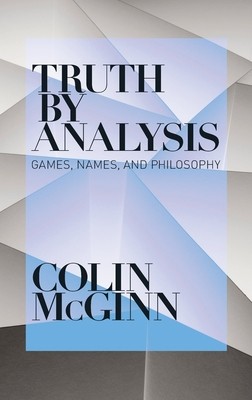
- We will send in 10–14 business days.
- Author: Colin Mcginn
- Publisher: Oxford University Press, USA
- ISBN-10: 0199856141
- ISBN-13: 9780199856145
- Format: 16.3 x 23.6 x 2.3 cm, kieti viršeliai
- Language: English
- SAVE -10% with code: EXTRA
Reviews
Description
What kind of subject is philosophy? Colin McGinn takes up this perennial question, defending the view that philosophy consists of conceptual analysis, construed broadly. Conceptual analysis is understood to involve the search for de re essences, but McGinn takes up various challenges to this meta-philosophy: that some concepts are merely family resemblance concepts with no definition in terms of necessary and sufficient conditions ("game", "language"); that it is impossible to provide sufficient conditions for some philosophically important concepts without circularity ("knowledge", "intentional action"); that there exists an unsolved paradox of analysis; that there is no well-defined analytic-synthetic distinction; that names have no definition; and that conceptual analysis is not properly naturalistic. Ultimately, McGinn finds none of these objections convincing: analysis emerges as both possible and fruitful.
At the same time, he rejects the idea of the "linguistic turn", arguing that analysis is not directed to language as such, but at reality. Going on to distinguish several types of analysis, with an emphasis on classical decompositional analysis, he shows different philosophical traditions to be engaged in conceptual analysis when properly understood. Philosophical activity has the kind of value possessed by play, McGinn claims, which differs from the kind of value possessed by scientific activity. The book concludes with an analytic discussion of the prospects for traditional ontology and the nature of instantiation. McGinn's study of the nature of philosophy shows us how philosophy can maintain its connection to the past while looking forward to a bright future.EXTRA 10 % discount with code: EXTRA
The promotion ends in 21d.21:07:53
The discount code is valid when purchasing from 10 €. Discounts do not stack.
- Author: Colin Mcginn
- Publisher: Oxford University Press, USA
- ISBN-10: 0199856141
- ISBN-13: 9780199856145
- Format: 16.3 x 23.6 x 2.3 cm, kieti viršeliai
- Language: English English
What kind of subject is philosophy? Colin McGinn takes up this perennial question, defending the view that philosophy consists of conceptual analysis, construed broadly. Conceptual analysis is understood to involve the search for de re essences, but McGinn takes up various challenges to this meta-philosophy: that some concepts are merely family resemblance concepts with no definition in terms of necessary and sufficient conditions ("game", "language"); that it is impossible to provide sufficient conditions for some philosophically important concepts without circularity ("knowledge", "intentional action"); that there exists an unsolved paradox of analysis; that there is no well-defined analytic-synthetic distinction; that names have no definition; and that conceptual analysis is not properly naturalistic. Ultimately, McGinn finds none of these objections convincing: analysis emerges as both possible and fruitful.
At the same time, he rejects the idea of the "linguistic turn", arguing that analysis is not directed to language as such, but at reality. Going on to distinguish several types of analysis, with an emphasis on classical decompositional analysis, he shows different philosophical traditions to be engaged in conceptual analysis when properly understood. Philosophical activity has the kind of value possessed by play, McGinn claims, which differs from the kind of value possessed by scientific activity. The book concludes with an analytic discussion of the prospects for traditional ontology and the nature of instantiation. McGinn's study of the nature of philosophy shows us how philosophy can maintain its connection to the past while looking forward to a bright future.

Reviews